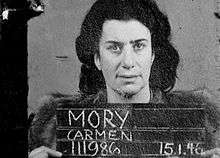Carmen Mory
Carmen Mory (2 July 1906 – 9 April 1947) was a Swiss-Nazi German spy and kapo in the Ravensbrück concentration camp. She was sentenced to death in the Hamburg Ravensbrück trials in 1947.
Carmen Mory | |
|---|---|
 Mory in a 1946 mugshot | |
| Born | 2 June 1906 Bern, Switzerland |
| Died | 9 April 1947 (aged 40) Hamburg, Germany |
| Cause of death | Suicide |
| Nationality | Swiss |
| Occupation | Journalist spy |
| Espionage activity | |
| Allegiance | Nazi Germany |
| Service branch | Gestapo |
| Service years | 1934–1938 |
Early life and career
Carmen Mory was born 2 July 1906 in Bern, Switzerland.[1] Before the war, she worked as a journalist, including for the Manchester Guardian (now The Guardian).[2] From 1932 to 1937 she worked as a journalist in Berlin, where in 1934 she became an undercover agent for the Gestapo, working under Bruno Sattler.[1][3][4] In 1937 she was assigned to observe publisher Emil Oprecht in Zurich and later that year, politician Max Braun in Paris.[1] She also collected information on the Maginot Line.[3]
Arrests and releases
In November 1938 she was arrested in France and on 28 April 1940, sentenced to death. She was pardoned on 6 June 1940;[1] according to some sources because she offered to become a double spy for the French.[3][5] Shortly afterward, Germany successfully completed its invasion of France. Having lost the trust of her superiors in the Gestapo, she was then arrested by German authorities, released, arrested again in 1941 and sent to Ravensbrück concentration camp where she became a head of the bloc (kapo).[1][3][4] Despite being a kapo, she was scheduled to be sent to the gas chamber, but a friend of her father struck her name off the list.[4]

In Ravensbrück she acquired a "monstrous" reputation,[6] with one source describing her as "sadomasochistic, psychopathic, sexually voracious [and] one of the camp's most notorious kapos".[7] She also had a close relationship with Anne Spoerry.[4][6]
Later life and death
After the end of the war, she was released from the camp. After being identified by other inmates for her actions in Ravensbrück,[4][8] she was arrested by the Allied authorities and sentenced to death in the Hamburg Ravensbrück trials in 1947; she committed suicide before the execution could take place.[1][4] She received significant if negative coverage in press during her trial, having been described as "the monster", a "third-rate Mata Hari", and "Bella Donna".[9]
References
- VW, Marco Jorio /. "Mory, Carmen". HLS-DHS-DSS.CH (in French). Retrieved 18 December 2018.
- Roberts, Yvonne (18 January 2015). "If This Is a Woman: Inside Ravensbrück, Hitler's Concentration Camp for Women review – profoundly moving". The Guardian. ISSN 0261-3077. Retrieved 18 December 2018.
- John Heminway (13 February 2018). In Full Flight: A Story of Africa and Atonement. Knopf Doubleday Publishing Group. p. 143. ISBN 978-1-5247-3298-1.
- Heminway, John (21 May 2010). "A legendary flying doctor's dark secret". FT Magazine. Retrieved 15 December 2018.
- John Heminway (13 February 2018). In Full Flight: A Story of Africa and Atonement. Knopf Doubleday Publishing Group. p. 144. ISBN 978-1-5247-3298-1.
- Margaret Anne Hutton (8 December 2004). Testimony from the Nazi Camps: French Women's Voices. Routledge. p. 87. ISBN 978-1-134-27339-3.
- Courier, Simon Lewis Special to The Post and. "Review: 'In Full Flight' a novel-like biography of a morally compromised Anne Spoerry". Post and Courier. Retrieved 18 December 2018.
- David M. Seymour; Mercedes Camino (14 October 2016). The Holocaust in the Twenty-First Century: Contesting/Contested Memories. Taylor & Francis. p. 247. ISBN 978-1-317-29958-5.
- John Heminway (13 February 2018). In Full Flight: A Story of Africa and Atonement. Knopf Doubleday Publishing Group. p. 178. ISBN 978-1-5247-3298-1.
Further reading
- (in German) Lukas Hartmann, Die Frau im Pelz: Leben und Tod der Carmen Mory, Zürich, Nagel & Kimche, 1999.
- (in German) Caterina Abbati, Ich, Carmen Mory: das Leben einer Berner Arzttochter und Gestapo-Agentin (1906–1947), Zürich : Chronos, 1999.